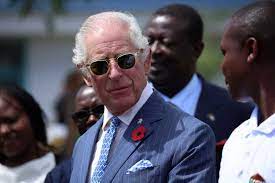Day 2 of King Charles’s Trip to Kenya: He Acknowledges the Amount of Colonial Mistreatment Experienced by Kenyans
Following his admission that there was “no excuse” for the wrongdoings committed during the colonial period when Britain ruled over the East African nation, King Charles III will start his second day of visits to Kenya on Wednesday.
During their four-day tour to Kenya with Queen Camilla, Charles expressed his desire to “deepen my own understanding of these wrongs” as well as support “a modern partnership of equals facing today’s challenges.”
Charles was expected to issue a formal apology to Kenya, a nation that Britain brutally governed for many years prior to Kenya’s arduous independence movement in 1963, before to his arrival.
The 74-year-old British head of state stated, “The misdeeds of the past are a cause of the greatest sorrow and the deepest regret,” on his first day in Kenya, but he did not offer an apology.
During their arduous fight for independence and sovereignty, Kenyans were subjected to heinous and inexcusable acts of bloodshed. And there can be no justification for it,” he said on Tuesday night at a state dinner.
“While nothing can alter the past, we can show how strong our friendship is today by discussing our past in an honest and transparent manner. By doing this, I hope we can continue to forge an ever-closer bond for the years to come.”
Although Charles has been to Kenya on three prior official trips, this is his first trip to an African or Commonwealth country since ascending to the throne last year.
Charles said that he will be visiting a war graves cemetery in Nairobi and Mombasa in the next few days to pay tribute to Africans who fought for Britain in two world wars and to plant trees in remembrance of the late Kenyan environmentalist Wangari Maathai.
“INSORTABLE FACTS”
Kenyan President William Ruto ceremoniously ushered Charles and Camilla onto the red carpet on Tuesday. They then placed a wreath at the Tomb of the Unknown Warrior at the Uhuru Gardens memorial park.
On December 12, 1963, at midnight, Kenya’s independence was proclaimed there. Kenya’s black, red, green, and white flag took the place of the Union flag, which was lowered.
However, the gardens were also constructed on the location of a camp where Mau Mau rebels were allegedly held by British colonial authorities between 1952 and 1960 while their revolt was being put down.
During the so-called “Emergency” era, at least 10,000 people, mostly from the Kikuyu tribe, were massacred in one of the deadliest insurgencies in the history of the British Empire.
Tens of thousands more were apprehended and imprisoned in camps where stories of brutal beatings, torture, and killings were frequent.
Charles has been pressured by several rights organizations to provide a clear and public apology for his misdeeds.
Ruto referred to the British reaction to Kenya’s desire for independence as “monstrous in its cruelty” and said that the Emergency “intensified the worst excesses of colonial impunity.”
Charles, however, had “courage and readiness to shed light on uncomfortable truths,” which he embraced.
When her father, King George VI, passed away in 1952, Queen Elizabeth II, who was still a princess at the time, found out in Kenya. This was the beginning of her historic 70-year reign.
Kenya has “long held such special meaning for my family,” according to Charles, highlighting his mother’s “particular affection” for the nation and its people.
The royal agenda also prioritizes youth, technology, and the creative arts as well as initiatives to combat climate change.







